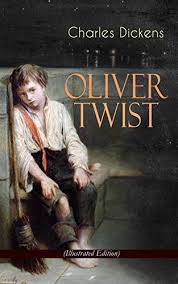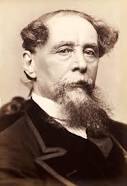Oliver Twist Page #3
Oliver Twist; or, the Parish Boy's Progress is Charles Dickens's second novel, and was published as a serial from 1837 to 1839 and released as a three-volume book in 1838, before the serialization ended. The story centres on orphan Oliver Twist, born in a workhouse and sold into apprenticeship with an undertaker.
'Do you give the children Daffy, Mrs. Mann?' inquired Bumble, following with his eyes the interesting process of mixing. 'Ah, bless 'em, that I do, dear as it is,' replied the nurse. 'I couldn't see 'em suffer before my very eyes, you know sir.' 'No'; said Mr. Bumble approvingly; 'no, you could not. You are a humane woman, Mrs. Mann.' (Here she set down the glass.) 'I shall take a early opportunity of mentioning it to the board, Mrs. Mann.' (He drew it towards him.) 'You feel as a mother, Mrs. Mann.' (He stirred the gin-and-water.) 'I--I drink your health with cheerfulness, Mrs. Mann'; and he swallowed half of it. 'And now about business,' said the beadle, taking out a leathern pocket-book. 'The child that was half-baptized Oliver Twist, is nine year old to-day.' 'Bless him!' interposed Mrs. Mann, inflaming her left eye with the corner of her apron. 'And notwithstanding a offered reward of ten pound, which was afterwards increased to twenty pound. Notwithstanding the most superlative, and, I may say, supernat'ral exertions on the part of this parish,' said Bumble, 'we have never been able to discover who is his father, or what was his mother's settlement, name, or condition.' Mrs. Mann raised her hands in astonishment; but added, after a moment's reflection, 'How comes he to have any name at all, then?' The beadle drew himself up with great pride, and said, 'I inwented it.' 'You, Mr. Bumble!' 'I, Mrs. Mann. We name our fondlings in alphabetical order. The last was a S,--Swubble, I named him. This was a T,--Twist, I named him. The next one comes will be Unwin, and the next Vilkins. I have got names ready made to the end of the alphabet, and all the way through it again, when we come to Z.' 'Why, you're quite a literary character, sir!' said Mrs. Mann. 'Well, well,' said the beadle, evidently gratified with the compliment; 'perhaps I may be. Perhaps I may be, Mrs. Mann.' He finished the gin-and-water, and added, 'Oliver being now too old to remain here, the board have determined to have him back into the house. I have come out myself to take him there. So let me see him at once.' 'I'll fetch him directly,' said Mrs. Mann, leaving the room for that purpose. Oliver, having had by this time as much of the outer coat of dirt which encrusted his face and hands, removed, as could be scrubbed off in one washing, was led into the room by his benevolent protectress. 'Make a bow to the gentleman, Oliver,' said Mrs. Mann. Oliver made a bow, which was divided between the beadle on the chair, and the cocked hat on the table. 'Will you go along with me, Oliver?' said Mr. Bumble, in a majestic voice. Oliver was about to say that he would go along with anybody with great readiness, when, glancing upward, he caught sight of Mrs. Mann, who had got behind the beadle's chair, and was shaking her fist at him with a furious countenance. He took the hint at once, for the fist had been too often impressed upon his body not to be deeply impressed upon his recollection. 'Will she go with me?' inquired poor Oliver. 'No, she can't,' replied Mr. Bumble. 'But she'll come and see you sometimes.' This was no very great consolation to the child. Young as he was, however, he had sense enough to make a feint of feeling great regret at going away. It was no very difficult matter for the boy to call tears into his eyes. Hunger and recent ill-usage are great assistants if you want to cry; and Oliver cried very naturally indeed. Mrs. Mann gave him a thousand embraces, and what Oliver wanted a great deal more, a piece of bread and butter, less he should seem too hungry when he got to the workhouse. With the slice of bread in his hand, and the little brown-cloth parish cap on his head, Oliver was then led away by Mr. Bumble from the wretched home where one kind word or look had never lighted the gloom of his infant years. And yet he burst into an agony of childish grief, as the cottage-gate closed after him. Wretched as were the little companions in misery he was leaving behind, they were the only friends he had ever known; and a sense of his loneliness in the great wide world, sank into the child's heart for the first time. Mr. Bumble walked on with long strides; little Oliver, firmly grasping his gold-laced cuff, trotted beside him, inquiring at the end of every quarter of a mile whether they were 'nearly there.' To these interrogations Mr. Bumble returned very brief and snappish replies; for the temporary blandness which gin-and-water awakens in some bosoms had by this time evaporated; and he was once again a beadle. Oliver had not been within the walls of the workhouse a quarter of an hour, and had scarcely completed the demolition of a second slice of bread, when Mr. Bumble, who had handed him over to the care of an old woman, returned; and, telling him it was a board night, informed him that the board had said he was to appear before it forthwith. Not having a very clearly defined notion of what a live board was, Oliver was rather astounded by this intelligence, and was not quite certain whether he ought to laugh or cry. He had no time to think about the matter, however; for Mr. Bumble gave him a tap on the head, with his cane, to wake him up: and another on the back to make him lively: and bidding him to follow, conducted him into a large white-washed room, where eight or ten fat gentlemen were sitting round a table. At the top of the table, seated in an arm-chair rather higher than the rest, was a particularly fat gentleman with a very round, red face. 'Bow to the board,' said Bumble. Oliver brushed away two or three tears that were lingering in his eyes; and seeing no board but the table, fortunately bowed to that. 'What's your name, boy?' said the gentleman in the high chair. Oliver was frightened at the sight of so many gentlemen, which made him tremble: and the beadle gave him another tap behind, which made him cry. These two causes made him answer in a very low and hesitating voice; whereupon a gentleman in a white waistcoat said he was a fool. Which was a capital way of raising his spirits, and putting him quite at his ease. 'Boy,' said the gentleman in the high chair, 'listen to me. You know you're an orphan, I suppose?' 'What's that, sir?' inquired poor Oliver. 'The boy is a fool--I thought he was,' said the gentleman in the white waistcoat. 'Hush!' said the gentleman who had spoken first. 'You know you've got no father or mother, and that you were brought up by the parish, don't you?' 'Yes, sir,' replied Oliver, weeping bitterly. 'What are you crying for?' inquired the gentleman in the white waistcoat. And to be sure it was very extraordinary. What could the boy be crying for? 'I hope you say your prayers every night,' said another gentleman in a gruff voice; 'and pray for the people who feed you, and take care of you--like a Christian.'
Translation
Translate and read this book in other languages:
Select another language:
- - Select -
- 简体中文 (Chinese - Simplified)
- 繁體中文 (Chinese - Traditional)
- Español (Spanish)
- Esperanto (Esperanto)
- 日本語 (Japanese)
- Português (Portuguese)
- Deutsch (German)
- العربية (Arabic)
- Français (French)
- Русский (Russian)
- ಕನ್ನಡ (Kannada)
- 한국어 (Korean)
- עברית (Hebrew)
- Gaeilge (Irish)
- Українська (Ukrainian)
- اردو (Urdu)
- Magyar (Hungarian)
- मानक हिन्दी (Hindi)
- Indonesia (Indonesian)
- Italiano (Italian)
- தமிழ் (Tamil)
- Türkçe (Turkish)
- తెలుగు (Telugu)
- ภาษาไทย (Thai)
- Tiếng Việt (Vietnamese)
- Čeština (Czech)
- Polski (Polish)
- Bahasa Indonesia (Indonesian)
- Românește (Romanian)
- Nederlands (Dutch)
- Ελληνικά (Greek)
- Latinum (Latin)
- Svenska (Swedish)
- Dansk (Danish)
- Suomi (Finnish)
- فارسی (Persian)
- ייִדיש (Yiddish)
- հայերեն (Armenian)
- Norsk (Norwegian)
- English (English)
Citation
Use the citation below to add this book to your bibliography:
Style:MLAChicagoAPA
"Oliver Twist Books." Literature.com. STANDS4 LLC, 2025. Web. 4 Jan. 2025. <https://www.literature.com/book/oliver_twist_331>.




Discuss this Oliver Twist book with the community:
Report Comment
We're doing our best to make sure our content is useful, accurate and safe.
If by any chance you spot an inappropriate comment while navigating through our website please use this form to let us know, and we'll take care of it shortly.
Attachment
You need to be logged in to favorite.
Log In